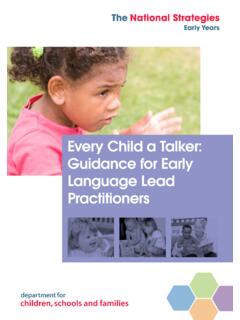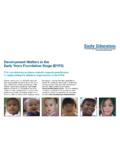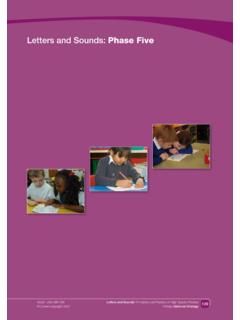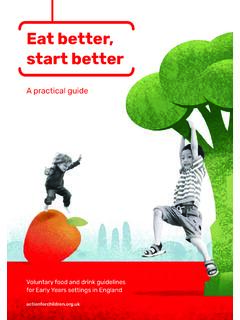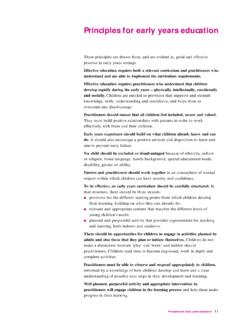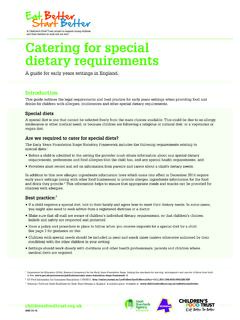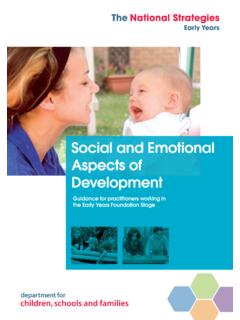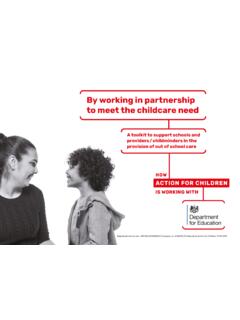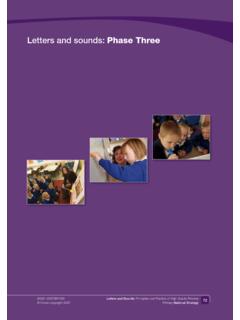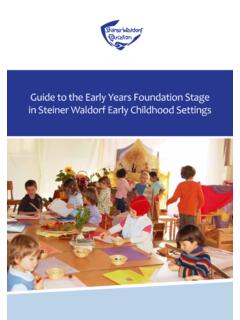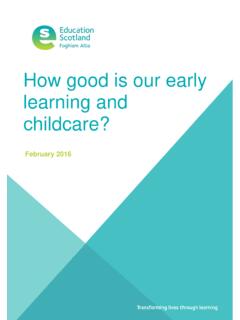Transcription of What to expect in the Early Years Foundation Stage
1 What to expect in the Early Years Foundation Stage :a guide for areas of learning and development your child s development happens Early , matters for a with three Characteristics of Effective Teaching and Matters: Birth to three to three: how you can help me with my Matters: 3 & 4-year & 4- Years -olds: how you can help me with my Matters: 4 & 5-year & 5- Years -olds: how you can help me with my to go to learn more2 What to expect in the Early Years Foundation Stage (EYFS) The Early Years Foundation Stage (EYFS) outlines what adults must do to help children learn and develop and to be healthy and safe. This guide is for parents* of children from birth to five Years old. It will help you find out more about your child s learning and development in the EYFS. The EYFS includes seven areas of learning and development.
2 In this guide the seven areas are split into three age bands**:oBirth to threeo3-4 o4-5 (the reception year in school) In each band, there are suggestions about what your child may be doing, and how you can help them. It s important to remember that children develop in different ways and at different rates. After each age band you will find top tips for fun, playful experiences that you and your child can do together at home.* Parent is used to mean parents, carers and guardians. **Theage bands followDevelopment Matters, which is the Government s non- statutory guide for all Early yearspractitioners, childminders, staff in nurseries, nursery schools, and nursery and reception classes in school. 3 Seven areas of learning and development in the EYFSC ommunication and LanguagePersonal, Social and Emotional DevelopmentPhysicalDevelopmentLiteracyMa thematicsUnderstanding theWorldExpressive Arts and DesignThe three prime areas are crucial for igniting children s curiosity and enthusiasm for learning.
3 The three prime areas are strengthened and applied through the four specific your child s development Children develop and learn at different rates and in different ways. Their development is not neat and orderly! That s why the Department for Education s guidance document, Development Matters, sets out children s learning in broad ages. It shows how lots of different experiences in the first three Years of life will help your child to learn. In this guide, When I m a baby broadly tells you about your child s development in the first year of life. When I ama bit older tells you about their development as a toddler and two-year old. 5 Understanding your child s development Development Mattersincludes some checkpoints. They can help you and your childminder or Early Years setting have a conversation, if you re worried about anything.
4 Then you can decide together what to do next. The checkpoints are not a ticklist to use for every child. Sometimes children have some Early difficulties in their development. With the right help, they can quickly grow out of these difficulties. For example, 70% of children with delayed communication in the Early Years won t have problems later in school. Those late talkers need lots of opportunities to chat, play and read. Some children will have long-term difficulties, so it s important to identify what their needs are and make sure they get the support they need. Every child can make good progress, with the right support. 6 What happens Early , matters for a lifetimeDid you know? The first three Years are the most sensitive time for brain development. your baby s Early interactions are incredibly important for building a healthy brain.
5 your baby is born ready to learn. When you interact with your baby, their brain forms more than a million new brain connections every single second! These Early moments (known as serve and return ). shape your child s brain in ways that help their learning, health, and behaviour both now and in the future. Over 80% of your baby s brain is formed by age three. Up to 75% of each meal goes to building your baby s brain. Playing and talking with your baby sparks millions of new brain happens Early , matters for a lifetimeLoving, responsive care Researchshows that the most important thing you can give your child is love and responsive care. Noticing what your baby needs and the signals they give helps you to build feelings of trust and safety. The comfort and care you offer your baby makes them feel safe to explore the world around them.
6 When your baby cries and you respond sensitively, your baby learns that they matter and that they can rely on you. 8 Physical development every movement counts It is important for your child to be physically active and to eat well. Children learn through their bodies. Every time they move, their brains build connections. Young children need lots of physical activity to develop their balance, posture and coordination. These are the foundations that will help your child to be physically ready to sit still and concentrate. Physical activity encourages the development of hand eye coordination for reading and writing. When your child is active, they are learning about their bodies and what they can do. They are also learning about social rules and managing their feelings. Physical activity for the Early years9 What happens Early , matters for a lifetime Researchtells us that what happens at home makes the biggest difference to your child s Early learning and development.
7 Playing together, singing, enjoying books, visiting the library, painting, drawing and finding out through play about letters, numbers and shapes are important activities to do at home. These activities are learning opportunities. These learning activities will make a difference to your child s learning right up to secondary school. 10 Chat, Play, ReadGiving your child the best start in life. Children love to talk about all sorts of things. Make timeto have back and forth conversations. Don t feel embarrassed talking to your baby it s never too soon to start communicating with them! Go with what your child is interested in. This will help them learn lot of new happens Early , matters for a lifetime 11 ChatThe benefits to your child learning more than one language are huge. Talk and play with your child in the language that you feel most comfortable and confident using.
8 Sing, read and tell stories in your home language rhyme and repetition help your child to remember words. Home languages give your child a connection to their culture and heritage. Encourage your child to use all their languages they will feel closer to people and part of their community. 12 Play Play helps children learn about the world and themselves. Children need time and space to play freely. Sometimes it is helpful if you sensitively join in with your child s play, too. Children need outdoor play. Play is essential for your child s wellbeing and development. It is part of the United Nations Convention on the Rights of the Child (1989). There are many everyday moments like bath time and dinner that you can make playful. Help your child to learn in a fun and relaxed way. 13 Read Sharing books and telling stories is a lovely way to build closeness and encourage conversations.
9 Sharing books with your child at a young age will help them to develop a love of reading. Read and share stories with your baby. Talk to your child about what is happening in the pictures. Young children love to hear and read their favourite books and stories again and again. Even a few minutes can make a difference. Have fun together! Use silly voices and act things out that happen in the book. 14 What happens Early , matters for a lifetimeBuildinga brighter,fairerfuturefor all The Early Years are vital for shaping children s views and attitudes. You can make a difference to how your child sees the world. It is important for you to think about your own views and be open to exploring your thinking. Boys and girls can do everything! But they are often treated differently, from an Early age. Limitations can start Early and hold children back.
10 1516 What happens Early , matters for a lifetime Parents of all races, ethnicities and cultures need to work together to understand how harmful racism is to everyone. Talking about race is the first step in challenging racism. Helping your child to develop anti-racist attitudes is so important: every child and family should have a sense of belonging irrespective of their race, ethnicity or culture. From three months, babies are aware of other races. Children are inquisitive. your child might notice differences in skin colour or ask questions that make you feel uncomfortable. It is important that your response is calm, positive and well-informed. 17 What happens Early , matters for a lifetimeHow you can help your child to talk about race: Between the ages of birth to three, children are naturally curious about the world around them.
